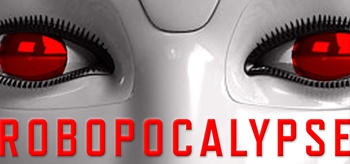Daniel H. Wilson Ph.D. discusses machines, artificial intelligence,
and a…

I can honestly say there were parts in the book where the hair on my arms stood up. I literally looked down in
my short-sleeved shirt and saw it happen. There are a lot of robot stories out there, and I’ve read many of
them, but this one should provide readers with something unexpected. It delivers a fun story with a broader
range of thrill, horror, and emotion than I expected myself. I interviewed Daniel for another article a couple
of years ago. He’s an interesting guy with a smart perspective on technology and a genuine love for robotics.
When you read “Robopocalypse” you’ll understand why Steven Spielberg grabbed hold of it for an upcoming major
motion picture.
(interview discussion)
What sparked your interest to write this particular book?
I was trained as a roboticist but I’m also a huge fan of robots in science fiction. This was my chance to tell a
robot uprising story that was really fun and terrifying, but also satisfied my logical side.
Where did you get the idea for the unique narrative style in which you tell the story?
The book is an interlocking collection of stories collected by the machines during a long war with humans. This
format let me choose to tell only the stories that were full of awesome, and to skip the boring stuff.
Did you intend an element of warning with this novel or is it purely fictional fun?
Pure fictional fun! I love technology and especially robotics, but it’s boring to write a book where robots and
humans skip hand in pincer through flowery fields.
You’re known to love robots. Did that make it difficult for you to give them such a malicious role?
I feel that if people read deeper into the book they will quickly see that the machines aren’t behaving any worse
than human beings would in the same situation. The robots have complicated goals, are not satisfied with being
dominated by human beings, and are willing to fight for what they believe in. I’m proud of ‘em!
You obviously have a good engineering mind having achieved your Ph.D., but you’ve also got the imagination of a
writer. Were there many times when you were working on an engineering or robotics project and that imagination ran
away with you?
Constantly. The very first part of every research project is to imagine the implications of what you plan to do.
You ask yourself, “Why is this important?” That requires a great imagination and every scientist has to do it
(otherwise they’ll never convince anyone to give them funding).
There are clear reasons to build more powerful computers; they’re necessary to accurately model things like
economics, the climate, and biological processes. Do you think we have an innate desire, however, to go beyond
that, to create our intellectual equal or greater?
A primary trait of the human species is curiosity. We are smart and creative and constantly driven to explore.
I believe that our innate inquisitiveness will culminate in the creation of artifacts that are as smart as we
are – or much, much smarter.
I found the story to be very chilling because it extrapolates from the course we’re already on in terms of
technological advancement. There’s a great deal of research going on in ‘machine learning’
and ‘self-programming’. I read an article recently describing a way that spintronic technology could actually
allow processing circuits to self-modify their hardware. Do you see any technologies in development that could
potentially lead to the kind of scenario you wrote about?
Most robot uprisings start with a machine gaining a super-human level of intelligence. Existing technology can
learn new things, modify its own software and/or hardware, and behave in surprising ways in the real world.
However, I’m not concerned that a machine is going to 1) suddenly gain sentience in a surprising way that we are
unprepared for, or 2) then decide that it desires to eradicate human beings, or 3) then have the capability to
do so. It’s fun to contemplate, but I just don’t see it.
In the novel an artificial intelligence experiment named Archos develops beyond the intent of its creator, into
something very dangerous. Do you think some form of ‘Archos’ is inevitable in our future?
I’m much more worried about how human beings will choose to use powerful technology, rather than how the
technology itself will choose to act. If history is any indication, we are the greatest threat to ourselves.
There’s a lot of varied opinion about what defines artificial intelligence. Some computer scientists believe it
already exists. Others would say that all we have right now is a sophisticated type of binary ‘mechanics’ with no
real ability for reason, creativity, or free will. How would you define the point where artificial intelligence
exists?
Artificial intelligence is a well-established field that has existed for over fifty years. AI algorithms are in
common use and solve human-intractable problems daily. In my opinion, any algorithm that can learn the solution
to a problem instead of being told is AI – whether it is ferrying items out of a dark warehouse or guiding a
missile to its target.
As I read the book it seemed like a very human story as well as a machine story. Did that balance come naturally
as you wrote it or did you plan that from the beginning?
My focus was never on the technology in Robopocalypse. I’ve got a fairly humanist point of view that nothing
really has meaning or value without people around. Who cares if the world is destroyed if there are no people
there to be effected by it? I tried to hone in on how different people with different relationships to
technology were having their lives changed (or ended) by this unprecedented set of events.
While you were immersed in writing were there times when it was hard to distinguish reality from the storyline?
I didn’t have any psychotic breaks while writing… that I know of. But the story is set in the near future, so
reading about Google’s autonomous cars or some of the semiautonomous weapons platforms being deployed in
Afghanistan and Pakistan were on the mark!
Can you tell our readers how the movie deal with Steven Spielberg came about?
I wrote a hundred pages and my agent went to sell the book to publishers. Somebody leaked the pages to
DreamWorks. I was shaking hands with Spielberg a week later. Basically, I won the nerd lottery and I am very
grateful for that.
What does it feel like waiting to see the final movie version of your novel?
The wait is agonizing... a sadistically prolonged Christmas Eve.

Daniel H. Wilson is a writer living in Portland, OR
Website
